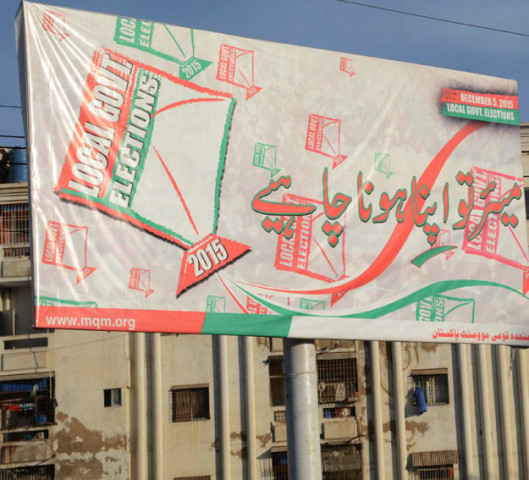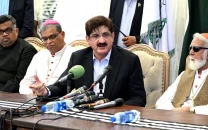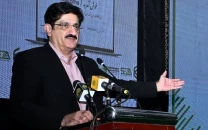Who will the most literate district in the country vote for?
District Central is also home to the largest number of people in the city

MQM election campaign for local government election. PHOTO: ONLINE
With the local government elections right around the corner, the city is abuzz with electioneering by different political parties trying to woo voters. Most parties seem to be concentrating on their stronghold areas, taking into account the voting patterns of yester-years.
Going by these numbers, District Central, which houses the headquarters of the Muttahida Qaumi Movement (MQM), seems to be a foregone conclusion for the party.
JI candidates using convict Mumtaz Qadri to garner votes
According to the Election Commission of Pakistan (ECP), the total number of voters in the district is 1,735,219, making it the highest tally in the city. Of these, 770,634 are female.
Surprisingly, only 32 female candidates are contesting the elections directly on December 5. Of these, four are contesting for the posts of chairman, seven for vice-chairman and the remaining for the seats of general councillors.
In all, the district comprises 51 union committees, which are in turn divided into 204 wards. Stretched across five sub-divisions — New Karachi, North Nazimabad, Gulberg, Liaquatabad and Nazimabad — the district houses several important landmarks and amenity schemes that are run directly by the Karachi Metropolitan Corporation (KMC), such as the Abbasi Shaheed Hospital, the third-largest medical facility in the city.
Moreover, the five constituencies of the National Assembly and 10 of the provincial assembly falling in the district are all represented by MQM lawmakers.
Grassroots representation: Stage set for third phase local government polls
Union committees 1 to 13 fall in sub-division New Karachi, 14 to 25 in North Nazimabad, 26 to 34 in Gulberg, 35 to 43 in Liaquatabad and 44 to 51 in Nazimabad.

SOURCE: DC CENTRAL / DESIGN: TALHA KHAN
Contestants
Initially 1,491 nomination papers were filed to the ECP, out of which 1,373 were accepted.
Subsequently, 48 candidates appealed to the tribunal against the rejection of their forms, all of which were accepted later on the orders of the tribunal. Meanwhile, 615 candidates withdrew their forms while another 18 were elected unopposed, leaving 788 contestants to fight the polls on December 5.
Minority candidates
Three minority candidates will also be contesting the December 5 polls from this district, two for the post of chairman and vice-chairman in UC-20, and one for the seat of general councillor in the same UC.
Elected unopposed
Eighteen candidates have been elected unopposed from District Central. They include two candidates from Union Committee (UC) 8, one from UC 10, one from UC 12, one from UC 13, one from UC 33, two from UC 40, three from UC 35, one from UC 36, two from UC 48, two from UC 50 and two from UC 51. All these candidates have been elected on the seat of general councillor on the MQM’s ticket.
Voicing concerns: PTI, JI leaders call on provincial election commissioner
Arrangements
The election commission will set up 1,057 polling stations, of which 119 will be for male voters, 119 for female and 819 will be combined stations. A total of 3,561 polling booths will be set up. The ECP has declared 198 polling stations most sensitive and 858 sensitive.
Speaking about the polling staff, the district election commissioner, Syed Nadeem Haider, told The Express Tribune that, 1,057 presiding officers, 7,080 assistant presiding officers and 3,540 polling officers will perform their duties.
In addition to this, 119 naib qasid will be deployed at the female polling stations, he added.
Diversity
The census of 1998 states that the district has a total population of 2,277,931, which includes people from various cultural and socio-economic backgrounds. Of these 73 per cent are Urdu-speaking, eight per cent are Punjabi-speaking and four per cent are members of the Pashtu community. The majority of the residents are Muslim, with two per cent of the total population registered as members of minority communities. The district also has the highest literacy rate in the country at 77 per cent.
Published in The Express Tribune, November 28th, 2015.



















COMMENTS
Comments are moderated and generally will be posted if they are on-topic and not abusive.
For more information, please see our Comments FAQ